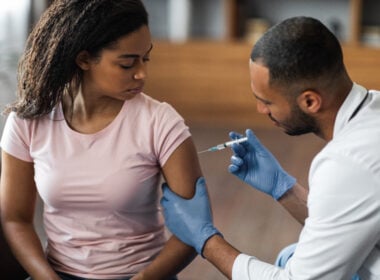The world of abortion is changing. As demand falls [1] and safety regulations increase, a number of abortion clinics are closing across the country. But abortion providers are increasingly relying on abortion pills (also known as medication abortions), ordered over the phone and the internet.
Today, over half of pregnancy terminations in the United States are carried out via medication. More and more women are going through the abortion process isolated at home and alone, with little medical oversight. What’s also changing, though, is that women who have begun a medicated abortion process have a chance to change their minds. The Abortion Pill Rescue Network, or APRN is a hotline that connects women to a global team of more than 1,000 doctors who can prescribe safe and effective medicine to help reverse a medication abortion and salvage a woman’s pregnancy, even after she has ingested an abortion-inducing drug.
Few women know about the option to reverse a medical abortion, which may be in part because few physicians and nurse practitioners are educated in abortion pill reversal. But it’s important that women be informed of all their options for their moments of crisis, whether in the middle of the day or the middle of the night.
How the abortion pill works
If a woman opts for a chemical abortion, an abortion provider will give her two pills to take. The first drug, mifepristone, is also sometimes sold under the names Mifeprex or RU-486. It inhibits the body’s ability to use its own progesterone in order to maintain the thickened uterine lining, or endometrium, which is vital to sustaining a pregnancy. The second pill, called misoprostol, is taken 24-48 hours later (sometimes via self-insertion into the vagina) and it induces labor. Common side effects of both drugs include vomiting, diarrhea, weakness, painful cramping, and heavy bleeding; potentially deadly allergic reactions have been reported, too [2].
If a woman has taken the first pill but changes her mind and decides she wants to continue with the pregnancy, she can potentially reverse the abortion process with prescription progesterone—flooding her body with ongoing doses of extra pregnancy hormones can serve as an antidote to the mifepristone’s effects.
Importantly, progesterone is safe for women and babies. It’s naturally produced inside the body and, as an FDA-approved medication, has been used for decades to help prevent miscarriage, and even pre-term birth [3]. In spite of its role in the abortion process, mifepristone isn’t associated with birth defects, so a woman reconsidering abortion doesn’t have to hesitate out of fear that she’s already hurt her baby.
Is abortion reversal treatment effective?
Progesterone’s proof is in the pudding. The Abortion Pill Rescue Network’s 2021 Impact Report noted that over 3,000 mom and baby pairs have been served. Pregnancy Help News quoted one grateful mom, Sarah, who carried her son Isaac to term after APRN helped her reverse the effects of the first abortion pill. “They were a beacon of hope in my darkest hour,” she told PHN. “I sought abortion because I had no support from the father, and feared the judgment of others… They really did save my son’s life, and mine. They don’t just try and save the baby, they empower their mother as well.”
As for supportive clinical studies, the research is hard to do. It would be highly unethical for researchers to give progesterone support to some pregnant women seeking abortion reversal and deny others, just to compare the two groups. But the small-scale studies that have been possible show that the reversal protocol offers women real hope. One study that examined the records of more than 700 women who interrupted a medication abortion found the fetal survival rate almost doubled to 48% after the women were administered natural progesterone, compared to a typical fetal survival rate of roughly 25% after mifepristone exposure without further intervention or treatment [4]. Higher doses of progesterone had even better results: injected progesterone produced a survival rate of 64%, and high oral doses reached 68%. That suggests a strong dose-response relationship. The women who received successful reversal treatment also wound up with a preterm birth rate of less than 3%, compared to 10% in the general population.
Why is it controversial to give women the choice to stop an abortion?
Skeptics of the reversal protocol sometimes advocate that those women who don’t want to continue the abortion process should just wait and see what happens if they don’t take their second pill, but evidence suggests that’s a missed opportunity to improve the chances of sustaining the pregnancy. As evidence of its potential danger, skeptics routinely point to the early termination due to safety concerns of a 2020 abortion pill reversal study study. The study was conducted by multiple researchers, including an abortion provider, with a vested financial interest in the promotion of abortion pills. But the study was not halted because of problems with the progesterone. It was stopped because three participants experienced bleeding severe enough to require a trip to the emergency room.
Of those three, all had taken Mifepristone (the first abortion pill) and then two had received a placebo and one had received progesterone. The two women who received Mifepristone and then a placebo underwent emergency surgery to stop the bleeding and one received a blood transfusion. The woman who received the progesterone had a completed abortion and her bleeding stopped on its own. Hemorrhage is a known potential risk of Mifepristone use, not of progesterone.
Abortion reversal shouldn’t be considered controversial. As another option on her reproductive journey, abortion reversal should be made known to women by their providers. Certainly no woman should be forced to complete an abortion she no longer wants, or be made to take medication about which she has changed her mind. To that end, it’s unfortunate that a woman may not know who to turn to for help in stopping the abortion process. She’s not likely to get help from her abortion doctor, and even the American College of Obstetricians and Gynecologists has shown skepticism of the procedure.
How to seek reversal of a medication abortion
Women seeking assistance can call 1-877-558-0333, with help available 24 hours a day, 7 days a week. APRN’s website, AbortionPillReversal.com, also has a chat option for patients who may prefer a texting approach. Support agents with APRN help connect women with providers who can legally prescribe the necessary treatment to carry out an abortion pill reversal. “We are always seeking to increase the number of women we can assist by adding medical providers to our network,” notes the site. Doctors, physician assistants, nurses and others who want to be there for women at one of the most vulnerable moments in life can apply to join online.
Of course, the abortion pill reversal protocol is just one small aspect of the process of abortion reversal. Prescribing a medication to try halt the process of abortion does not take a woman out of the crisis that made her seek abortion in the first place. It does not pay for her bills, help in situations of domestic violence, provide support, or help with feelings of overwhelm. Therefore, it is also vital to connect women seeking a reversal with a reputable pregnancy resource center, which can help with many of the issues and reasons why women feel abortion is their only option.
The Abortion Pill Reversal Network is operated by Heartbeat International, the world’s largest affiliation of pregnancy support organizations. Heartbeat International helps with locating crisis pregnancy centers as well as connecting women to a medical provider, because it is dedicated to the idea that mothers and their babies are both valuable, and both of their lives are worth protecting. The Network offers women who have started the termination process two things that one might not usually encounter in the world of abortion: a second chance, and most of all, hope.
This article was last updated on February 1, 2023 to reflect current statistics and information on a 2020 study of abortion pill reversal safety.
References
[1] Foster D. Dramatic Decreases in US Abortion Rates: Public Health Achievement or Failure?. Am J Public Health. 2017;107(12):1860-1862. doi:10.2105/ajph.2017.304152. Available at: https://www.ncbi.nlm.nih.gov/pmc/articles/PMC5678419/ [2] Shin H, Lee S, Roh A et al. Anaphylactic shock to vaginal misoprostol: a rare adverse reaction to a frequently used drug. Obstet Gynecol Sci. 2018;61(5):636. doi:10.5468/ogs.2018.61.5.636. Available at: https://www.ncbi.nlm.nih.gov/pmc/articles/PMC6137020/ [3] Choi S. Use of progesterone supplement therapy for prevention of preterm birth: review of literatures. Obstet Gynecol Sci. 2017;60(5):405. doi:10.5468/ogs.2017.60.5.405. Available at: https://www.ncbi.nlm.nih.gov/pmc/articles/PMC5621069/ [4] The Reversal of the Effects of Mifepristone by Progesterone. PRACTICE BULLETIN 6: EVIDENCE DIRECTING PRO-LIFE OBSTETRICIANS & GYNECOLOGISTS. Nov. 2019;(6):1-8. https://aaplog.org/wp-content/uploads/2020/01/FINAL-PB-6-Abortion-Pill-Reversal-1.pdf.Additional Reading:
Progesterone Helps Prevent Miscarriage: Good News for Moms and Babies
Study Suggests that Giving Progesterone to Women May Improve Chances of Having a Baby
Low Progesterone Can Be a Big Problem
The Use of Progesterone Supplements in Treating Postpartum Depression
Synthetic vs Natural Hormones—the Difference Between Harmful and Safe
5 Causes of Infertility that (Almost) No One Talks About












As a board-certified APRN obstetrician/gynecologist who resigned from the American College of Obstetricians and Gynecologist when abortion politicized it, I thank you for getting the word out to women in crisis pregnancies: you are not alone and there is hope.